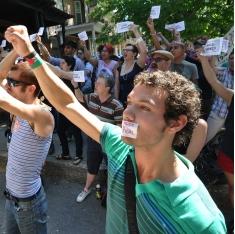UPDATE MAY 26 – About 100 gay and lesbian people gathered at the Dundonald St offices of Pride Toronto (PT) on May 25 to protest the organization’s decision to censor the term “Israeli apartheid” from this year’s Pride celebration.
As the crowd chanted “Whose Pride? Our Pride!” and “Resign! Resign! Resign!” visibly nervous PT board co-chair Genevieve D’Iorio – separated from the protesters by an iron fence and police guard – told media that “complaints of discriminatory and exclusionary messaging” led PT to ban the phrase “Israel apartheid” from the July 4 parade.
“This is a terrible day in Pride’s history,” says Elle Flanders, spokesperson for Queers Against Israeli Apartheid (QuAIA), the Palestinian rights group so obviously the target of the move. “If we had taken out Totally Naked Toronto Men or Dykes on Bikes, or other people who have offended other people, we wouldn’t have a Pride.”
“We’re more than happy that people come in and march for the rights of queers in Palestine and queers in Israel,” says D’Iorio. “But the reality is that this particular term has been the crux.”
D’Iorio says city and corporate sponsors are threatening to pull funding, and banning the phrase “Israeli apartheid” is the best position PT organizers could take. Pride simply wouldn’t happen, she says, without the city’s financial and in-kind support.
“This decision was long overdue and it’s the right decision,” says lawyer Martin Gladstone. “The broad-based community, virtually all of our political and civic leaders, the sponsors and our stakeholders all think it’s the right decision.”
Gladstone created the anti-QuAIA video Reclaiming Our Pride, and almost singlehandedly led the movement to lobby the city and PT sponsors to kick QuAIA out of the parade.
“Martin Gladstone has been an effective lobbyist, and I doff my hat to him,” says Flanders. “But this whole situation is due to the beef of this one particular right-wing guy with his right-wing politics…. If he’s got something to say, why don’t we get to have something to say?”
“Nobody’s censoring free speech,” replies Gladstone, who was not at the protest, choosing instead to speak with Xtra later over the phone. “But they have to grow up. Like every other recipient of public money or corporate money, there are compliance issues. Pride has no choice.”
“This isn’t a free speech issue,” Gladstone continues. “They can go anywhere and march, wherever they want, but it’s not what Pride’s sponsors and our stakeholders and our funders sign up for…. They’re hurting our Pride parade.”
Tim McCaskell, a long-time gay community activist and educator who did attend the protest, and who also participated in Toronto’s earliest Pride marches, vehemently disagrees.
“Any kind of human rights violation affects queers directly, and those struggles have always been present at Pride,” he says.
“If Pepsi can march in Pride, if the Bank of Montreal can march in Pride, if the Canadian fucking military recruitment office can march in Pride, why can’t these queer people with a political agenda – whether you agree with it or not – march in Pride?” says playwright Brad Fraser, spokesman for the newly created Pride Coalition for Free Speech. “Shutting down QuAIA leads to someone else getting shut down next.”
PT executive director Tracey Sandilands insists that, because of QuAIA’s message, many potential Pride participants “don’t feel welcome because of their faith.”
“I don’t even know what that means,” says Flanders. “Have they never seen dissent? What is so threatening here, other than a bunch of signs saying, ‘End the Israeli occupation?’“
“We’re 30 percent down on our sponsorship from last year,” says Sandilands. “And many potential sponsors – no, I won’t say who – have said they’re concerned that Pride is getting involved with political issues that we shouldn’t be getting involved in…. We can’t move forward allowing one group with one viewpoint and one particular phrase that everyone finds offensive to the detriment of 20 or 30 other groups who also consider themselves part of our community.”
“We’re not just some fringe group,” says Flanders. “I was on the board of Pride three years ago…. I was asked to create a human rights contingent and built up the politics of Pride, but simultaneously, Pride was saying, ‘Can you keep it small?’ They want to have a little politics but not so much that it spoils the party.”
PT, she says, represents “a new group of people riding the wave of civil rights that we’ve managed to gain through sweat and labour and activism just like this: noisy people saying, ‘We demand to be heard’ and speaking for those who aren’t heard. Pride has somehow forgotten about that.”
In spite of PT’s decision to censor QuAIA, Sandilands says Pride’s growth from “a little grassroots march” is a great step for global human rights.
“The fact that we are as big as we are gives us the unique opportunity and responsibility to take a stand on issues affecting queer people in other countries and actually be heard, get global media and make a difference,” she says, noting that Pride will focus instead on the many countries that have no queer rights at all.
McCaskell vows that, ban or no, QuAIA’s message will get out at Pride.
“I’ve been arrested before on free speech issues, but I’m willing to be arrested again if that’s what it takes,” he says. “You can be damn sure that we’ll be there.”
Flanders says, “They want to make this all go away, but politics are a part of Pride. It’s us this year; it’ll be somebody else next year.”
Watch our video report from the protest:
>> Read the Pride Toronto board resolution to disallow the term “Israeli apartheid” (PDF)
UPDATE MAY 25
Pride Toronto held a press conference this morning to announce that, following a contentious 4-3 vote by its board last week, the organization intends to ban the use of the term “Israeli apartheid” from any messaging in the Pride parade on July 4. About 80 QuAIA members and supporters turned out to protest the move, chanting “Whose Pride? Our Pride!” and “Resign! Resign! Resign!”
Though Pride Toronto insists the action isn’t “directed at any one group,” the decision affects the group Queers Against Israeli Apartheid (QuAIA). Pride Toronto executive director Tracey Sandilands and board co-chairs Genevieve D’lorio and Margaret Ngai told the jeering crowd that the term “Israel apartheid” has led to “complaints of discriminatory and exclusionary messaging.”
The issue “has escalated to the point where Pride Toronto’s festival is in a state of operational crisis,” D’Iorio told the crowd. With the City of Toronto and corporate sponsors threatening to pull funding, she insists, the board has rescued the Pride festival from cancellation.
“They’re not going to take away the funding,” says playwright Brad Fraser, part of The Pride Coalition for Free Speech. “There’s this pervasive fear being built up that bad things are going to happen if you let QuAIA march, but they would be insane to cut funding to the largest festival in Toronto!”
Pride Toronto’s decision to censor the messaging may head off the June 14th vote on funding by Toronto City Council, but Fraser says Pride Toronto has made a huge mistake in caving on free speech. “It’s not going to be easy for them,” he says.
Check back soon for more on this story – including interviews with Pride Toronto organizers and QuAIA activists.


 Why you can trust Xtra
Why you can trust Xtra


